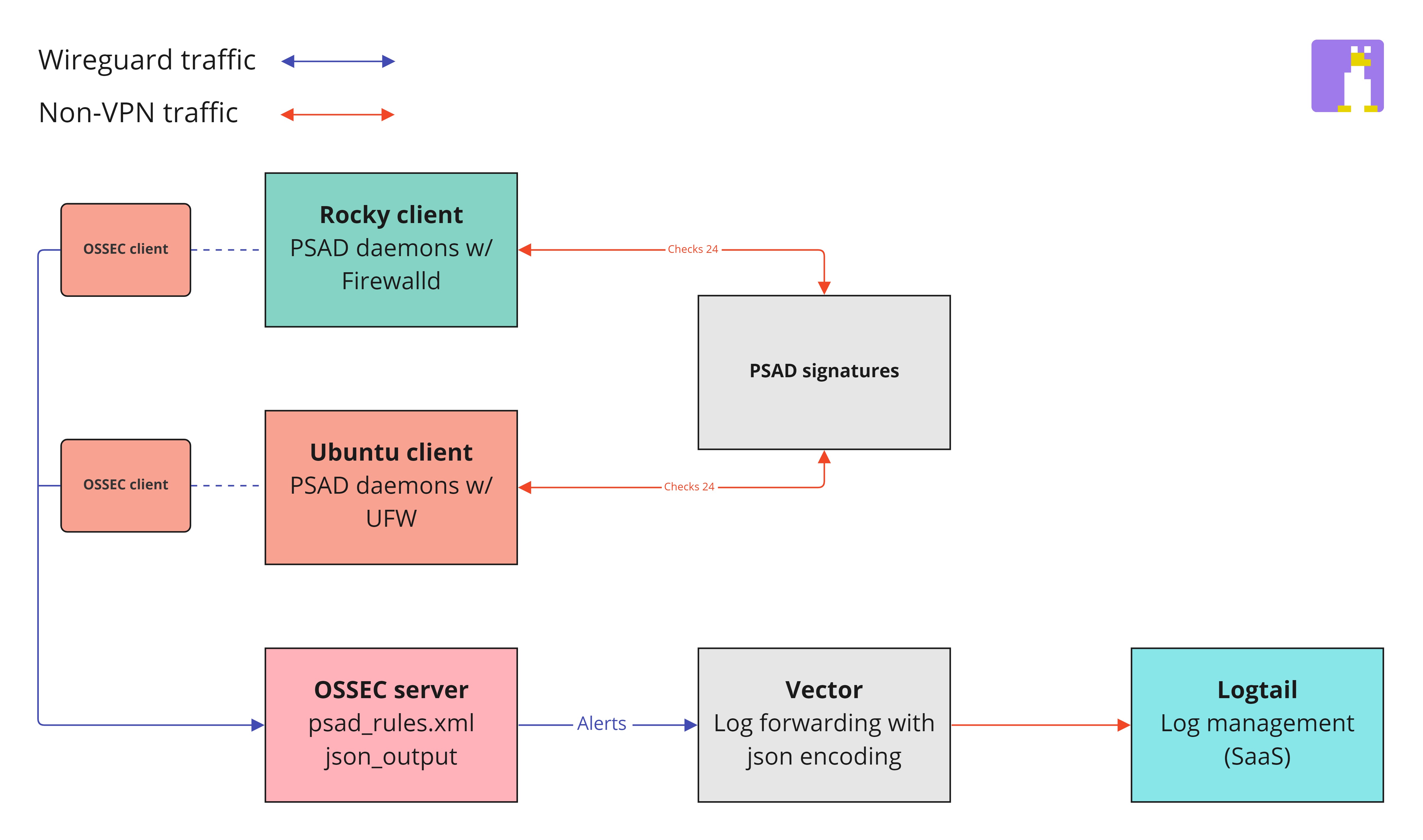PSAD Intrusion Detection with Log Analysis Rev 2
PSAD (Port Scan Attack Detector) is a collection of three lightweight system daemons (two main daemons and one helper daemon) that run on Linux machines and analyze iptables log messages to detect port scans and other suspicious traffic. A typical deployment is to run PSAD on the iptables firewall where it has the fastest access to log data.
Setup and configuration have been tested on the following operating systems:
- Ubuntu- 16.04, 18.04, 20.04 (Focal Fossa), Rocky 8.4 (Green Obsidian)
- PSAD- 2.2.3 -> 2.4.6
Configuration files
Prerequisites
Dependancies when installing PSAD from source.
net-toolsg++
Install PSAD from source
Make sure you have installed the dependency packages and once complete download the lastest stable version from the PSAD GitHub, extract and run the installation script.

server@ubuntu:~$ sudo apt-get update && \
sudo apt-get -y upgrade && \
sudo apt-get -y install net-tools g++ && \
wget https://github.com/mrash/psad/archive/2.4.6.tar.gz && \
tar -zxvf 2.4.6.tar.gz && cd psad-2.4.6/ && \
sudo ./install.pl
server@rocky:~$
[+] psad alerts will be sent to:
root@localhost
[+] Would you like alerts sent to a different address ([y]/n)? n
[+] By default, psad parses all iptables log messages for scan activity.
However, psad can be configured to only parse those iptables messages
that match particular strings (that are specified in your iptables
ruleset with the --log-prefix option).
Would you like psad to only parse specific strings in iptables
messages (y/[n])? n
[+] By default, psad matches Snort rules against any IP addresses, but
psad offers the ability to restrict signature matches to specific
networks with the HOME_NET variable (similar to Snort). However, psad
also offers the ability to acquire all local subnets on the local system
by parsing the output of "ifconfig", or the subnets can be restricted
to a limited set of networks.
First, is it ok to leave the HOME_NET setting as "any" ([y]/n)? y
[+] psad has the capability of sending scan data via email alerts to the
DShield distributed intrusion detection system (www.dshield.org). By
default this feature is not enabled since firewall log data is sensitive,
but submitting logs to DShield provides a valuable service and assists
in generally enhancing internet security. As an optional step, if you
have a DShield user id you can edit the "DSHIELD_USER_ID" variable
in /etc/psad/psad.conf
Would you like to enable DShield alerts (y/[n])? n
[+] Setting hostname to "client@ubuntu" in /etc/psad/psad.conf
[+] The latest psad signatures can be installed with "psad --sig-update"
or installed now with install.pl.
If you decide to answer 'y' to the next question, install.pl
will require DNS and network access now.
Would you like to install the latest signatures from
http://www.cipherdyne.org/psad/signatures (y/n)? y
[+] Enable psad at boot time ([y]/n)? y
[+] psad has been installed.
server@rocky:~$
Configuration
The email address will be left as default (root@localhost;) as in this tutorial we'll use OSSEC to manage the alerts.
$ sudo nano /etc/psad/psad.conf
### Machine hostname
HOSTNAME server@ubuntu;
### Specify the home and external networks. Note that by default the
### ENABLE_INTF_LOCAL_NETS is enabled, so psad automatically detects
### all of the directly connected subnets and uses this information as
### the HOME_NET variable.
HOME_NET 192.168.0.0/24;
EXTERNAL_NET any;
IPT_SYSLOG_FILE /var/log/syslog;
EXPECT_TCP_OPTIONS Y;
EMAIL_ALERT_DANGER_LEVEL 3;
### Allow reporting methods to be enabled/restricted. This keyword can
### accept values of "nosyslog" (don't write any messages to syslog),
### "noemail" (don't send any email messages), or "ALL" (to generate both
### syslog and email messages). "ALL" is the default. Both "nosyslog"
### and "noemail" can be combined with a comma to disable all logging
### and alerting.
ALERTING_METHODS noemail;
server@rocky:~$
To check the status of PSAD execute the following command.
server@ubuntu:~$ sudo psad -S
server@rocky:~$
Enable PSAD rules in OSSEC
To enable OSSEC to decode and respond to PSAD rules being triggered follow the instructions found here.
Firewall settings
The firewall being used is UFW (Uncomplicated Firewall). It is set by default to deny incoming traffic, allow outgoing traffic and allow port 22 (OpenSSH). Read more about UFW here.
UFW Settings
server@ubuntu:~$ sudo ufw default deny incoming
server@ubuntu:~$ sudo ufw default allow outgoing
server@ubuntu:~$ sudo ufw allow 22
server@ubuntu:~$ sudo ufw enable
Command may disrupt existing ssh connections. Proceed with operation (y|n)? y
Firewall is active and enabled on system startup
First enable logging using the built-in UFW command below.
server@ubuntu:~$ sudo ufw logging on
Logging enabled
server@rocky:~$
Once logging been enabled you'll also need to alter the UFW rules. Edit both configuration files (before.rules and before6.rules) and add the following before the COMMIT line.
server@ubuntu:~$ sudo nano /etc/ufw/before.rules
server@ubuntu:~$ sudo nano /etc/ufw/before6.rules
server@rocky:~$
# custom psad logging directives
-A INPUT -j LOG
-A FORWARD -j LOG
# do not delete the "COMMIT" line or these rules wont be processed
COMMIT
server@rocky:~$
Next reload UFW and proceed to check psad with the built-in firewall analyze tool.
server@ubuntu:~$ sudo ufw reload
server@ubuntu:~$ sudo psad --fw-analyze
[+] Parsing INPUT chain rules.
[+] Parsing INPUT chain rules.
[+] Firewall config looks good.
[+] Completed check of firewall ruleset.
[+] Results in /var/log/psad/fw_check
[+] Exiting.
server@rocky:~$
Command-line
| Command | Description |
|---|---|
| psad -R | Restart psad |
| psad -S | psad status |
| psad --fw-analyze | Analyze the local iptables ruleset |
| psad --sig-update | Download the latest set of psad signatures |
| psad -H | Send all psad daemons a HUP signal to have them re-import configs |
